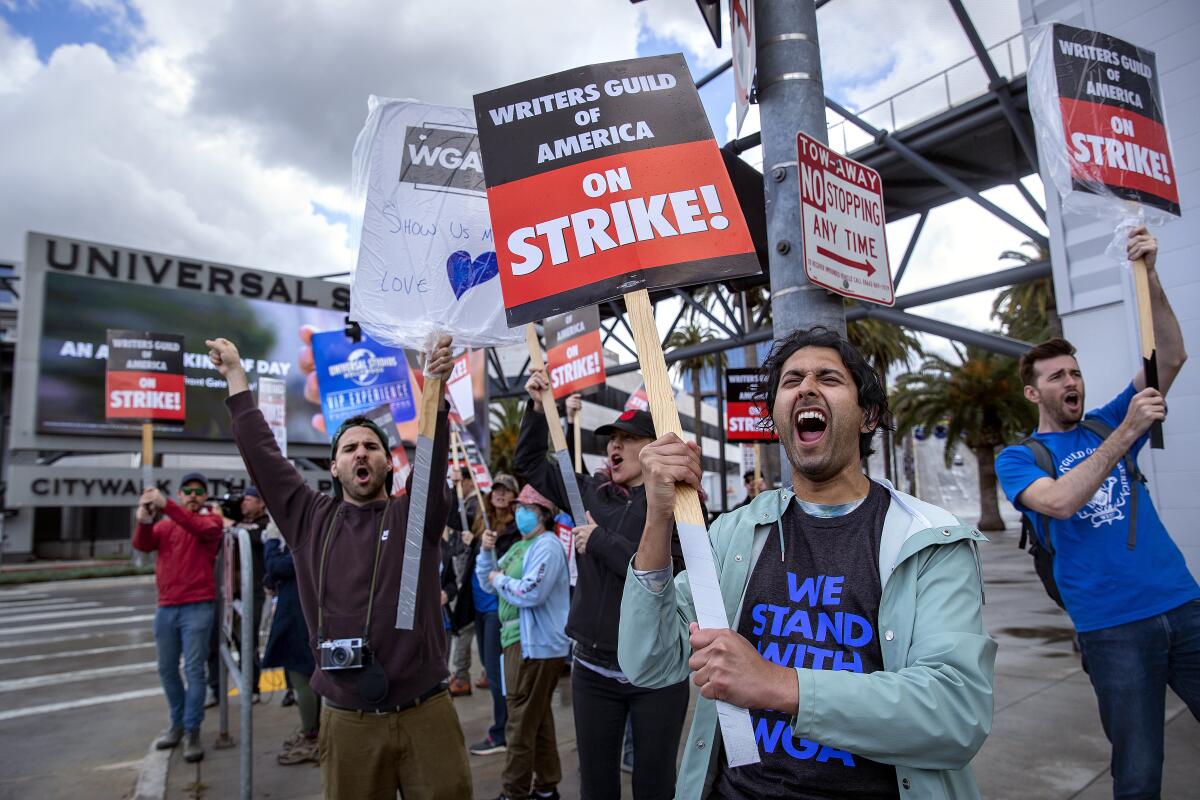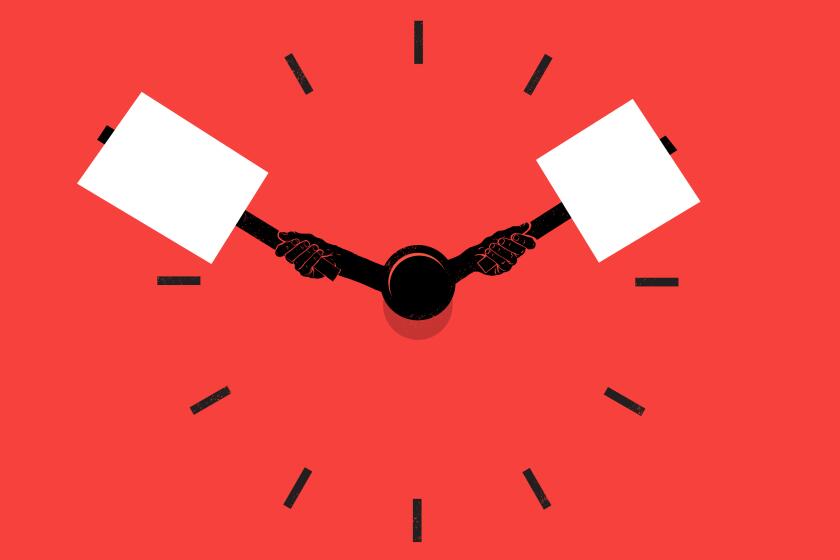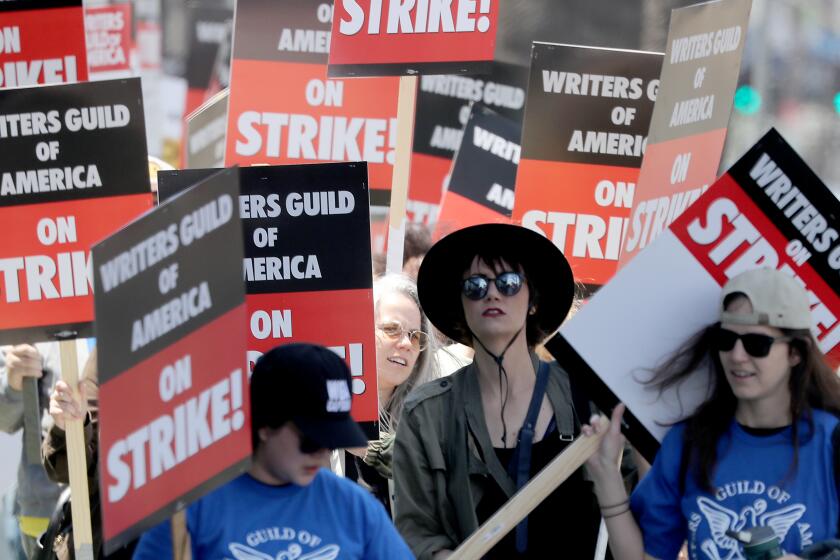Hollywood studios push back on writers’ dismissal of their bargaining offer

- Share via
Hollywood studios and streamers are pushing back on claims by the Writers Guild of America that its strike was triggered by paltry counteroffers or an unwillingness to negotiate key terms.
The Alliance of Motion Picture and Television Producers said that it offered a $97-million annual increase in minimum wages. A proposed 4% increase in the first year of the contract was the highest in 25 years, according to a document the alliance released on Thursday.
As writers wrap their third day of picketing productions and studios, pressure is growing on both sides to explain how talks to negotiate a new three-year film and TV contract broke down.
Hollywood’s writers went on strike, but what were the issues that led to the fallout with the studios and streamers. Here are six issues where talks fell apart.
The writers’ strike, which has triggered pickets in Los Angeles and New York, has already had an impact on late-night shows, forcing networks to show repeats, and is prompting performers to cancel appearances.
The WGA had no immediate comment on the document.
Union negotiators have complained that the rise of streaming is making their work more like a gig economy, where they have to cobble together a series of jobs to make ends meet.
But studios, under pressure from Wall Street to cut costs, rejected that characterization, saying most television writers are employed on a weekly or per episode basis, with guarantees for work on a specific number of shows.
Hollywood writers formed picket lines in L.A. and New York after the Writers Guild of America called a strike for better pay and working conditions.
“Writing jobs come with substantial fringe benefits that are far superior to what many full-time employees receive for working an entire year, including employer-paid health care, employer-paid contributions into a pension plan and eligibility for a paid parental leave program,” the AMPTP said in the document.
The producers alliance — which represents studios such as Walt Disney, Apple and Netflix in contract bargaining — has said talks broke down over WGA requirements for mandatory staffing and a minimum length of employment for its writers.
The WGA has argued it wants to preserve the writers room in shows, where groups of writers gather to create the show over months. And it has blasted the prevalence of so-called “mini-rooms” favored by streamers — where just a few writers are hired for short periods of time — saying they have eroded writers’ pay and job opportunities.
As a remedy, the WGA had demanded writers’ rooms have six to 12 writers, and that writers be engaged for at least 10 consecutive weeks.
The studios said this would tie their hands and preclude writers from deciding how they want to work.
“It is in reality a hiring quota that is incompatible with the creative nature of our industry,” the AMPTP said. “We don’t agree with applying a one-size-fits-all solution to shows that are unique and different in their approach to creative staffing. Some writers are the sole voice of a show and others work with only a small team.”
A list of counterproposals from the AMPTP to demands from the WGA in 2023
The AMPTP said that its members agreed to introduce an entirely new payment structure for writers employed before a firm commitment has been made to produce a series. The offer included higher minimum rates, a 15% premium on script fees and increased fees for pilot scripts involving high budget streaming series.
Further, studios said they agreed to a proposal to pay staff writers script fees — something the WGA has been pursuing for decades — adding $42,000 to their salary.
On the contentious issue of streaming residuals, the studios argued that they previously granted a 46% increase to streaming residuals —royalties for re-airing shows — in the last contract they negotiated in 2020.
“In many cases, writers have only recently begun to see these increases in their paychecks,” the AMPTP said.
WGA proposals in talks for a new contract in 2023
The 2023 writers’ strike is over after the Writers Guild of America and the Alliance of Motion Picture and Television Producers reached a deal.
Writers have complained that the amount they receive in residuals, which they rely on to make it through leaner periods of work, are much less than what broadcast networks would pay.
The AMPTP said that under the current formula for a one-hour series produced for Netflix or Amazon Prime Video, a writer would receive $72,000 in residuals for one episode over three years. Over five years, that amount grows to $99,000, and then to $114,000 over seven years.
Another point of conflict: WGA negotiators sought to regulate the use of artificial intelligence and felt insulted by an offer from the companies to hold annual meetings on the advancements in technology instead.
But the studios argued that writers are already protected by language in their existing contracts that a writer has to be a person and AI material can’t be copyrighted.
“AI raises hard, important creative and legal questions for everyone,” the AMPTP said.
More to Read
Inside the business of entertainment
The Wide Shot brings you news, analysis and insights on everything from streaming wars to production — and what it all means for the future.
You may occasionally receive promotional content from the Los Angeles Times.














